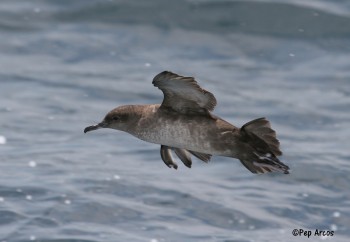Rhiannon Meier (National Oceanography Centre, Southampton, UK) and colleagues have published open-access in the journal Biological Conservation on at-sea movements of the ACAP-listed Balearic Shearwater Puffinus mauretanicus.
The paper’s abstract follows:
“Unprecedented changes to the marine environment and growth of bio-logging science make detailed study of the movement ecology of threatened marine species timely. Here, we study spatial and temporal patterns of marine space use by a critically endangered seabird: the Balearic shearwater Puffinus mauretanicus. Using a suite of bio-logging systems, 67 foraging trips were recorded during incubation periods between 2011 and 2014 from one of the species’ largest colonies (Sa Cella, Mallorca). Most birds followed narrow flight corridors to restricted neritic foraging grounds on the Iberian continental shelf. Productive foraging areas along the Catalan coast (NE Spain) were consistent across multiple years and between sexes, indicating extensive use of predictable resources. While our study emphasises the vulnerability of this species to anthropogenic activity in nearshore waters, consisteant commuting corridors and foraging grounds represent tractable habitat for protection and offer hope for developing area-based management approaches. Preferred foraging areas showed strong overlap with recently declared Special Protection Areas, strengthening the evidence base for targeted management at these sites.”

Balearic Shearwater, photograph by Pep Arcos
Reference:
Meier, R.E., Wynn, R.B., Votier, S.C., McMinn Grivé, M., Rodríguez, A., Maurice, L., van Loon, E.E., Jones, A.R., Suberg, L., Arcos, J.M., Morgan, G., Josey, S.A. & Guilford, T. 2015. Consistent foraging areas and commuting corridors of the critically endangered Balearic shearwater Puffinus mauretanicus in the northwestern Mediterranean. Biological Conservation 190: 87–97
John Cooper, ACAP Information Officer, 23 July 2015

 English
English  Français
Français  Español
Español